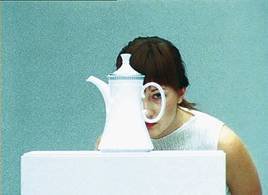Runa Islam
dal 27/11/2008 al 7/2/2009
Segnalato da
27/11/2008
Runa Islam
Kunsthaus Zurich, Zurich
Restless subject. Islam's work revolves around the medium of film and all its many facets. Born in Bangladesh in 1970 and currently living and working in London, she deconstructs linear narrative patterns and time sequences and makes the act of seeing - both in the sense of looking and of perceiving - the focus of her art. Her work is about questioning filmic illusion and laying bare the political structures that underpin the society we live in, although they may well prove hard to detect at first.

From 28 November 2008 to 8 February 2009, the Kunsthaus Zürich presents
‘Runa Islam. Restless Subject’, Switzerland’s first solo exhibition of the work
of Runa Islam. Born in 1970 in Dhaka (Bangladesh) and now living in London,
Islam subjects filmic illusions to critical scrutiny while drawing a bead on the
act of seeing, which she understands as both sight and recognition. In addition
to four recent films by the artist, the Kunsthaus also features a work created
especially for the exhibition.
AN ARTISTIC DECELERATION OF THE QUOTIDIAN
Runa Islam’s poetic films are visually powerful documents, interlacing analysis
with sensibility on multiple levels. The film ‘First Day of Spring’ (2005) is a group
portrait of rickshaw drivers in Dhaka. There are some 500,000 such drivers in
the artist’s hometown, most of them drawn from the countryside to try their luck
at earning their family’s daily bread in the big city. The government blames the
rickshaws for Dhaka’s endless traffic jams and is forever banning them from the
streets. But ‘First Day of Spring’ betrays none of this hectic atmosphere. The
rickshaw drivers sit comfortably astride their bicycles, apparently content to
enjoy the eponymous occasion in peace. And it’s true, they can: because Islam
has paid them to skive, and pose for her camera instead. As a work of art, too,
the piece challenges traditional cinematic technique. Islam’s takes are long,
almost static, and her camera approaches the group of rickshaw drivers from a
range of perspectives, pausing every now and again to record the gentle spring
breeze blowing through the foliage, then zooming in to capture individual faces
before the drivers take off into the evening sunlight. With its subtle intensity and
visual power, ‘First Day of Spring’ is an enthralling work of art, both a critique of
cinematic legerdemain and an exposé of socio-political phenomena.
POLITICAL ISSUES TREATED WITH FORMAL RESEARCH
In ‘The house belongs to those who inhabit it’, a 16mm-film she made for this
year’s Manifesta7 at an industrial wasteland in the South Tyrol, Islam takes a
similar approach. The organizers of M7 had originally planned to use the
location themselves for the exhibition, but the area was too unsafe and the
grounds too polluted by their erstwhile occupants. The only inhabitants now
were squatters, who had moved into the empty buildings and left some graffiti
on the walls. And yet, despite this political context, Islam deliberately avoids
insisting on any particular interpretation of her work, preferring instead to leave it open to various possible readings. She attempts to enter into dialogue with her
viewers, and thus help them to orient themselves.
‘The house belongs to those who inhabit it’ is in addition a piece of formal
research, in which Islam continues her investigations of ‘camera movement’ and
‘film as language’.
EXHIBITION TITLE AND NEW FILM WORK
The issue of movement, of the relationship between a still and a moving picture,
is also central to the other films shown in the cabinet. The title of the exhibition,
‘Restless Subject’, gestures both at the contingent significance of the moving
picture to the cinematic project as well as at today’s society, which is constantly
in motion, and deeply individualized.
Runa Islam has created a new film (Untitled, 2008) for the exhibition curated by
Mirjam Varadinis. The work will be shown in an installation specially designed
for the cabinet by Islam in collaboration with the Slovenian artist Tobias Putrih
(born 1972).
The exhibition in the Kunsthaus Zürich, Islam’s first one-woman show in
Switzerland, is a collaboration with the Museum Folkwang, Essen, which is
showing works by Islam in parallel with the Swiss exhibition. A catalogue in
English and German (167 pages with approx. 260 colour illustrations) is on sale
at the Kunsthaus shop for CHF 42.–.
Supported by ART MENTOR FOUNDATION LUCERNE.
Image: film still from Runa Islam, Be the first to see what you see as you see it, 2004. Courtesy Jay Jopling/White Cube London, © Runa Islam
For further information and visual material, please contact
Kunsthaus Zürich, Press and Communication, Kristin Steiner
kristin.steiner@kunsthaus.ch, tel. +41 (0)44 253 84 13
Kunsthaus Zürich
Heimplatz 1, CH–8001 Zurich
Open Sat, Sun, Tues 10 a.m.–6 p.m., Wed, Thurs, Fri 10 a.m.–8 p.m.
Admission incl. collection: CHF 12 / red. and groups CHF 8
Christmas: 24 and 26 December 10 a.m.–6 p.m., 25 December closed
New Year’s: 1 and 2 January 2009 10 a.m.–6 p.m.



